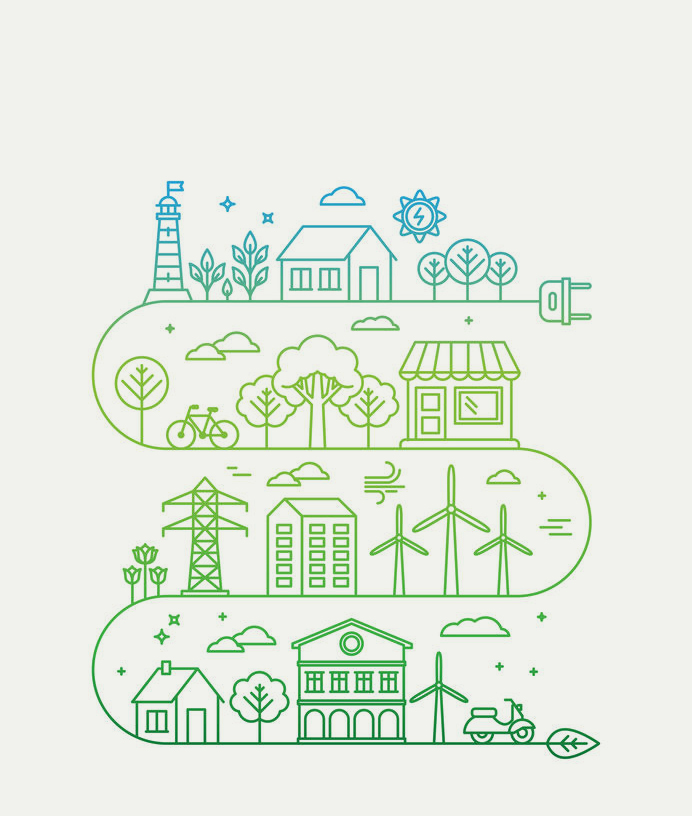Quem semeia conhecimento, colhe desenvolvimento
A dimensão das áreas de negócio justifica uma forte política de responsabilidade social e ambiental que implica uma preocupação com o presente, com respeito pelo futuro da empresa e de todos os que a envolvem, não pondo em causa a sustentabilidade de recursos e da sociedade em geral.
O Grupo JMV contribui ativamente para a melhoria da qualidade de vida dos seus clientes, colaboradores, fornecedores e comunidade, preocupando-se em implementar medidas que a possam promover.
SEED
To Develop
O Grupo JMV aposta:
- numa política de desenvolvimento dos seus colaboradores, que assenta na formação contínua e no estímulo para um bom desempenho.
- na preocupação com a segurança e o bem-estar dos colaboradores, de modo a garantir que as funções desempenhadas e os postos de trabalho não exerçam impacto na sua saúde.

SEED
To Care
O Grupo JMV promove:
- a interação da empresa com a comunidade local através de donativos a Instituições de Ação Social que atuam nas mais variadas áreas.

SEED
To Live
O Grupo JMV estimula a promoção de um estilo de vida saudável, de uma alimentação equilibrada e da prática de atividade física como condições essenciais para a saúde e o bem-estar através de:
- da utilização de semáforos nutricionais nas embalagens
(que informam o consumidor dos valores nutricionais do produto);
- do desenvolvimento de uma aplicação para IOS e Android que contempla georreferenciação de locais de prática de atividades desportivas e de bem-estar próximos do posicionamento do utilizador de smartphone;
- do patrocínio a Instituições desportivas de várias modalidades

SEED
To Preserve
De destacar na política de sustentabilidade ambiental do Grupo JMV:
- o cumprimento integral e um rigoroso controlo de critérios legais de qualidade, segurança, higiene e ambiente. Para isso, a empresa dispõe de um Departamento de Qualidade que define, implementa e controla o cumprimento de todas as normas.
- a utilização eficiente dos fatores de produção (máquinas, energia, matérias-primas, frota automóvel) e eliminação de desperdícios.
- a rigorosa separação, valorização e eliminação de resíduos e materiais (cartão, plásticos, vidros, toner de impressora, pilhas, embalagens metálicas, metais, equipamentos elétricos e eletrónicos, paletes, sacos de juta, óleos industriais, entre outros).
- as instalações produtivas da JMV estão equipadas com um parque de resíduos –preparado para fazer a separação, eliminação e enfardamento de resíduos. Não causam impacto visual, nem existe ruído exterior associado à sua atividade.
- o cumprimento integral da legislação sobre emissões gasosas, campo em que a empresa regista valores muito inferiores aos limites legais (a torrefação de café é uma atividade com um reduzido impacto ambiental, quer a nível de efluentes industriais, quer a nível de emissões gasosas).
- a preocupação com a gestão dos efluentes industriais, materializada na Sociedade dos Vinhos Borges (outra empresa do mesmo Grupo) através da instalação no Centro de Produção da Lixa, em 2009, de uma Estação de Tratamento de águas Residuais (ETAR) compacta com tecnologia SBR (Sequential Batch Reactor). Esta nova ETAR é capaz de tratar 200 metros cúbicos de efluente por dia, através de um sistema de tratamento mais fiável, vigoroso e versátil, que responde melhor à variabilidade de caudal.
- a utilização de materiais ambientalmente sustentáveis, recicláveis e reutilizáveis (como a juta, a cortiça natural e o vidro).
- o cuidado com a preservação da biodiversidade nas Quintas da sua propriedade, conservando as surribas, os antigos prados e as pequenas matas e mantendo os cursos de água naturais.
- na vinha, a preocupação com a minimização do gasto de água (através da utilização de pulverizadores equipados com anti gotejo); a redução do uso de herbicidas residuais; e a substituição de fertilizantes sintéticos por corretivos orgânicos.
- uma reduzida Pegada Ecológica - fruto da sua eficiência na utilização dos fatores de produção; da política de separação, valorização e eliminação de resíduos e materiais; e do reduzido impacto ambiental a nível de efluentes industriais e a nível de emissões gasosas.


SEED
To Improve
O Grupo JMV impulsiona:
- a abertura da empresa a Instituições de Ensino através da receção de visitas, da disponibilização de informação para a realização de trabalhos académicos, da colocação de estagiários para integração profissional, entre outras. Adicionalmente, o Grupo JMV premeia os melhores trabalhos académicos com relevância para as suas áreas de negócio: produção e distribuição de cafés e vinhos (www.jmv.pt/seed).

SEED
To Develop
O Grupo JMV aposta:
- numa política de desenvolvimento dos seus colaboradores, que assenta na formação contínua e no estímulo para um bom desempenho.
- na preocupação com a segurança e o bem-estar dos colaboradores, de modo a garantir que as funções desempenhadas e os postos de trabalho não exerçam impacto na sua saúde.

SEED
To Care
O Grupo JMV promove:
- a interação da empresa com a comunidade local através de donativos a Instituições de Ação Social que atuam nas mais variadas áreas.

SEED
To Live
O Grupo JMV estimula a promoção de um estilo de vida saudável, de uma alimentação equilibrada e da prática de atividade física como condições essenciais para a saúde e o bem-estar através de:
- da utilização de semáforos nutricionais nas embalagens
(que informam o consumidor dos valores nutricionais do produto);
- do desenvolvimento de uma aplicação para IOS e Android que contempla georreferenciação de locais de prática de atividades desportivas e de bem-estar próximos do posicionamento do utilizador de smartphone;
- do patrocínio a Instituições desportivas de várias modalidades

SEED
To Preserve
De destacar na política de sustentabilidade ambiental do Grupo JMV:
- o cumprimento integral e um rigoroso controlo de critérios legais de qualidade, segurança, higiene e ambiente. Para isso, a empresa dispõe de um Departamento de Qualidade que define, implementa e controla o cumprimento de todas as normas.
- a utilização eficiente dos fatores de produção (máquinas, energia, matérias-primas, frota automóvel) e eliminação de desperdícios.
- a rigorosa separação, valorização e eliminação de resíduos e materiais (cartão, plásticos, vidros, toner de impressora, pilhas, embalagens metálicas, metais, equipamentos elétricos e eletrónicos, paletes, sacos de juta, óleos industriais, entre outros).
- as instalações produtivas da JMV estão equipadas com um parque de resíduos –preparado para fazer a separação, eliminação e enfardamento de resíduos. Não causam impacto visual, nem existe ruído exterior associado à sua atividade.
- o cumprimento integral da legislação sobre emissões gasosas, campo em que a empresa regista valores muito inferiores aos limites legais (a torrefação de café é uma atividade com um reduzido impacto ambiental, quer a nível de efluentes industriais, quer a nível de emissões gasosas).
- a preocupação com a gestão dos efluentes industriais, materializada na Sociedade dos Vinhos Borges (outra empresa do mesmo Grupo) através da instalação no Centro de Produção da Lixa, em 2009, de uma Estação de Tratamento de águas Residuais (ETAR) compacta com tecnologia SBR (Sequential Batch Reactor). Esta nova ETAR é capaz de tratar 200 metros cúbicos de efluente por dia, através de um sistema de tratamento mais fiável, vigoroso e versátil, que responde melhor à variabilidade de caudal.
- a utilização de materiais ambientalmente sustentáveis, recicláveis e reutilizáveis (como a juta, a cortiça natural e o vidro).
- o cuidado com a preservação da biodiversidade nas Quintas da sua propriedade, conservando as surribas, os antigos prados e as pequenas matas e mantendo os cursos de água naturais.
- na vinha, a preocupação com a minimização do gasto de água (através da utilização de pulverizadores equipados com anti gotejo); a redução do uso de herbicidas residuais; e a substituição de fertilizantes sintéticos por corretivos orgânicos.
- uma reduzida Pegada Ecológica - fruto da sua eficiência na utilização dos fatores de produção; da política de separação, valorização e eliminação de resíduos e materiais; e do reduzido impacto ambiental a nível de efluentes industriais e a nível de emissões gasosas.

SEED
To Improve
O Grupo JMV impulsiona:
- a abertura da empresa a Instituições de Ensino através da receção de visitas, da disponibilização de informação para a realização de trabalhos académicos, da colocação de estagiários para integração profissional, entre outras. Adicionalmente, o Grupo JMV premeia os melhores trabalhos académicos com relevância para as suas áreas de negócio: produção e distribuição de cafés e vinhos (www.jmv.pt/seed).









